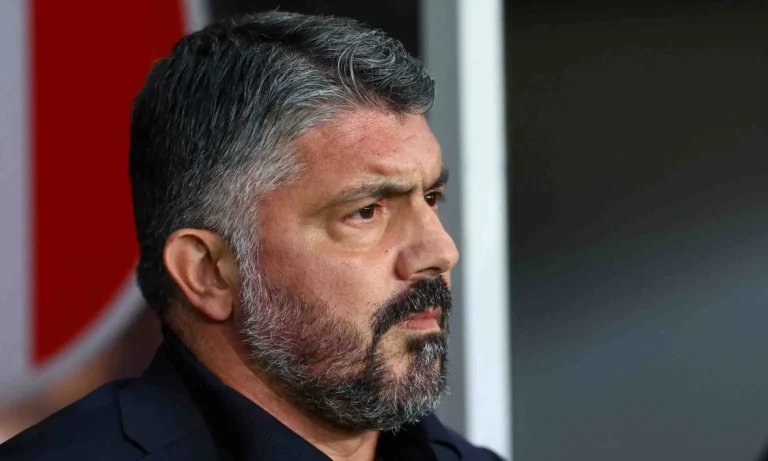Italy’s head coach, Gennaro Gattuso, has spoken with visible emotion about the ongoing war in Gaza ahead of his team’s 2026 World Cup qualifiers — one of which will be played against Israel. His words come at a time when Italy is witnessing widespread protests calling for solidarity with Palestinians and demanding that the match against Israel be canceled.
Also Read: Alexander Zverev Crashes Out of Shanghai Masters, Calls His Season “Terrible”
The Azzurri are set to play Estonia in Tallinn on Saturday, followed by a high-stakes and politically sensitive match against Israel in Udine next Tuesday. However, Gattuso admitted that the atmosphere surrounding the upcoming fixtures has been far from ideal. “We know that we have to play the match because otherwise we’ll lose 3-0… but it’s very sad to see what’s happening to innocent people, children, it hurts my heart to see all of that,” he told reporters.
Across Italy, public anger over the humanitarian crisis in Gaza has grown. Last weekend, the country saw some of Europe’s largest pro-Palestinian protests. Thousands of people marched through major cities, condemning Israel’s ongoing offensive and demanding justice for the victims of Gaza. The war, now in its second year, has caused immense devastation — with Palestinian health officials reporting more than 67,000 deaths, nearly a third of whom are children.
The protests have even reached the football field. Demonstrators gathered outside Italy’s national training center in Florence last week, urging authorities to call off the match against Israel. More rallies are expected in Udine before and during Tuesday’s game. Italian police have prepared an extensive security operation, anticipating around 10,000 protesters outside the stadium and roughly 5,000 to 6,000 spectators inside.
Gattuso admitted that the situation has affected his players’ mindset. “It won’t be an easy atmosphere because there will be so much emotion involved,” he said. “I would have preferred to play at home in front of an enthusiastic crowd like we did in Bergamo, where we won 5-0 against Estonia.” Ticket sales for the match have been sluggish, with many empty seats expected, reflecting the discomfort many fans feel about the fixture.
The call to ban Israel from international sports has been gaining traction as outrage over the conflict grows. Since October 2023, when Hamas launched an attack on Israeli communities, Israel has played its home matches in Hungary due to the security situation. During Italy’s previous encounter against Israel in Debrecen in September, Italian supporters turned their backs during the Israeli national anthem and displayed banners with the message “Stop,” signaling their opposition to the war.
Despite the tension, Gattuso’s focus remains on football. His start as Italy coach has been promising, with two wins from two matches. However, the team’s 5-4 victory over Israel in September exposed defensive weaknesses. “There are many things we need to fix,” he admitted. “It’s not just about the defence but also about being alert and reading danger everywhere on the pitch. At the same time, there are positives — we managed to fight till the end.”
Italy currently sits second in Group I with nine points, tied with Israel and six points behind leaders Norway, though Italy has a game in hand. Only the top team from each group qualifies directly for the World Cup, while the second-placed team must go through the playoffs. After missing out on the last two World Cups, Gattuso is determined to return Italy to football’s biggest stage.
But beyond the competition, the upcoming match against Israel represents more than just a qualifying battle — it mirrors the growing intersection of sports and politics. As emotions rise and protests intensify, Gattuso’s heartfelt comments remind the world that football, despite its global reach, cannot remain untouched by human tragedy.
The game in Udine will be played amid sorrow, controversy, and hope — a moment when sport, compassion, and conscience converge on the same field.


